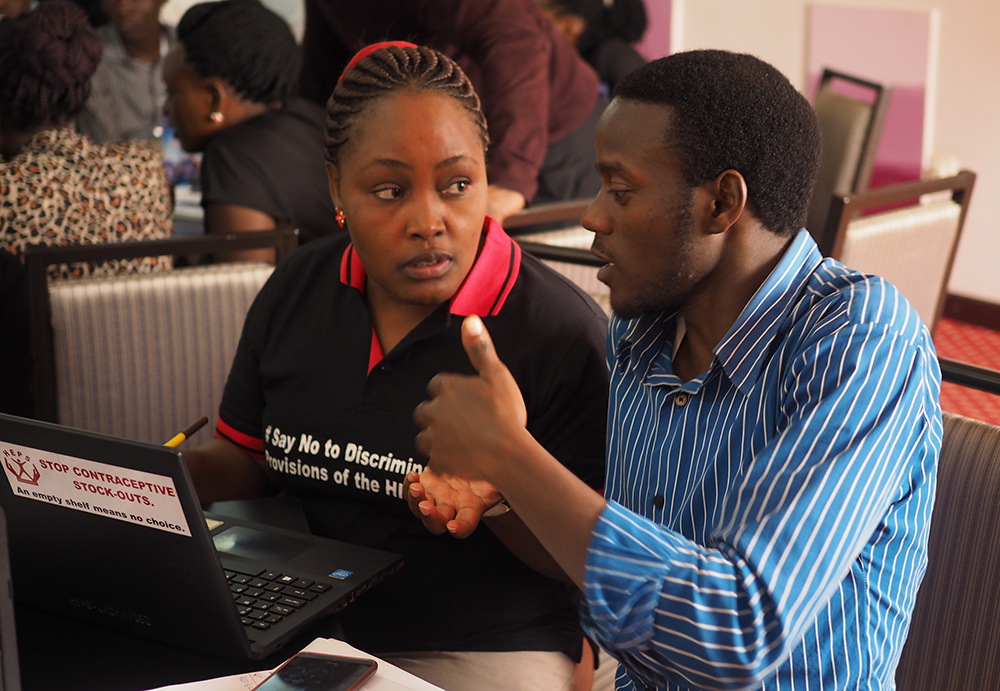 |
| Participants in an ISER/CESR workshop in Uganda on using the OPERA Framework for monitoring economic and social rights. |
It is increasingly recognized that violations of economic, social and cultural rights (ESC rights) are among the most urgent and pervasive of human rights abuses, but the complex and systemic nature of these deprivations can make them difficult to monitor, document and therefore challenge. For this reason, CESR supports activists and advocates in all corners of the globe in confronting these methodological obstacles and holding their governments to account for social and economic policies that lead to human rights shortfalls.
In the most recent example of this work, we began a new phase in our ongoing collaboration with the Asia Pacific Forum, a regional network of National Human Rights Institutions (NHRIs), aimed at strengthening their effectiveness in addressing ESC rights. In late January, CESR’s Allison Corkery and Mihir Mankad led a five-day training workshop for South East Asian NHRIs on monitoring economic, social and cultural rights, hosted in Manila by the Philippines Commission on Human Rights. Over the course of the workshop, participants from the NHRIs of Indonesia, Malaysia, Myanmar, The Philippines, Thailand and Timor Leste, developed action plans for conducting robust human rights monitoring on priority issues in their countries.
The action plans incorporate tools and tactics for monitoring socio-economic policies from a human rights perspective that were introduced through a four-week online course delivered late last year. Topics covered in the online course included using CESR’s OPERA Framework, data analysis and scrutinizing budgets. As part of our partnership with the Danish Institute for Human Rights (DIHR), we are also currently developing a new introductory e-learning course on ESCR for the Global Alliance of National Human Rights Institutions (GANHRI), which will be rolled out to NHRIs around the world later this year. The workshop in Southeast Asia and the global e-learning course are part of an ongoing DIHR/GANHRI project funded by the European Union.
In recent times, NHRIs around the world have been seeking to engage with economic, social and cultural rights more effectively, particularly in the context of monitoring implementation of the Sustainable Development Goals (SDGs). Given their unique institutional position as quasi-governmental bodies with a mandate to oversee human rights compliance, the potential for impact on SDG implementation on the ground is tremendous.
The findings produced through effective monitoring can also help to equip international human rights accountability mechanisms with information they need to make stronger, more actionable recommendations to governments. A recent example of such an outcome is our collaboration with the Initiative for Social and Economic Rights (ISER) in Uganda. In late March, the Human Rights Council adopted some noteworthy recommendations to the country, following its Universal Periodic Review (UPR) last November. The UPR recommendations picked up a number of the key issues raised in a series of factsheets on the rights to health, education, food, housing and other economic and social rights in Uganda, which were developed jointly by CESR and ISER in advance of the review.
Promisingly, Council members made significantly more recommendations on ESC rights than they did at Uganda’s previous appearance in 2011. As documented by CESR in a recent study, the UPR has tended to focus more on civil and political rights than on ESC rights, despite the fact that it is mandated to address all categories of human rights equally. Having led efforts pushing for the Council to engage more meaningfully with these rights, CESR was encouraged to see the Outcome Report from Uganda’s review gave extensive attention to ESC rights deprivations.
At the session in March, the Ugandan government committed to many of these recommendations, including improving provisions for the right to education, to introducing a national health insurance scheme and enacting a national action plan on business and human rights. It has also stated that it will take urgently-needed steps to improve the quality of education and to address the human rights problems arising from rapid urbanization.
ISER and CESR welcomed these recommendations and the potential they offer to catalyze the policy reforms so badly needed to tackle long-standing human rights deprivations and development shortfalls in the country. However they argued that active engagement of civil society at the national level in monitoring their implementation will be critical, as will providing the necessary budgetary resources to honour these commitments.
Related: